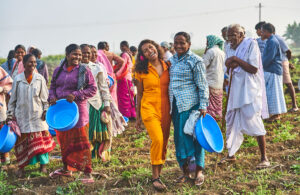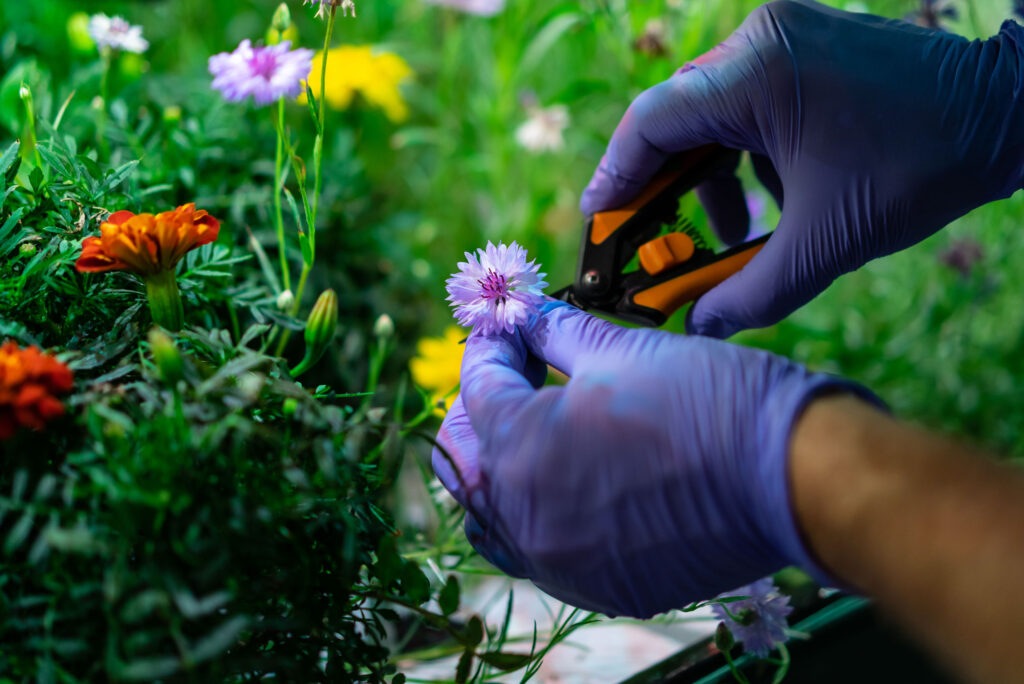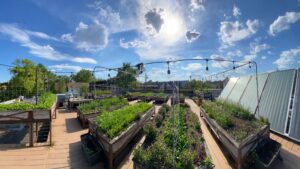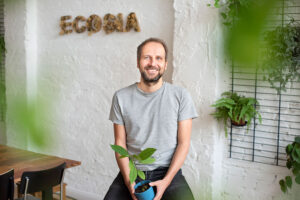
Diaspora Co – Building a Better, Equitable Spice Trade
Creating an equitable spice trade by disrupting an outdated trade system and putting money and power into the hands of Indian farmers.
USA
Monica Janvier November 23, 2020
In 2016, the sustainable farming business Farm.One was created by CEO and Founder Rob Laing in NYC. Farm.One began as a small, experimental farm at the Institute of Culinary Education (ICE) in NYC, serving top restaurants. The vision was to grow and provide interesting, unusual produce to chefs using the new technology of vertical farming.
Since then, Farm.One has built small farms across NYC. The main larger flagship farm is built underground in Tribeca, Manhattan. The sustainable farming business is expanding its small farms to cities across the world. Vertical farming technology uses less water and less space than traditional farming. Farm.One is able to grow over 700 varieties of plants in unique and tight spaces with sustainable farming methods. Each delivery includes baby greens, microgreens, rare herbs and edible flowers. The produce is packaged using sterilized, reusable containers, eliminating plastic waste. The produce is also pesticide free, picked and delivered the same day and is transported by bike or subway directly to chefs and restaurants across cities, eliminating carbon transmissions.
You can learn more about this sustainable farming business and vertical farming through Farm.One’s website, in-person tours, hydroponics classes, webinars, and instructional sessions.
Mood of Living: Where did you grow up?
Rob Laing: I was born in Melbourne, but went back and forth between Melbourne and London, UK, because of my British parents, then ended up at high school in Belgium and spent 8 years in Japan! So, I have a mixed British/Australian/American accent now.

MoL: Where did you go to school? What did you study?
RL: I studied graphic design in Camberwell at the University of the Arts in London — a small art school that definitely shaped how I see the world!
MoL: What was your professional background prior to creating Farm.One?
RL: I started my career in design agencies by building websites and working on creating brands. But I caught the startup bug. Before creating Farm.One, I co-founded a startup, Gengo, a technology-based translation app. We built that company to a pretty good size, with VC backing – but ultimately, I moved on and wanted to do something very different.
MoL: How did you find your passion for the culinary world?
RL: After I left Gengo, I was lucky enough to be able to travel and take culinary classes – specifically plant-based cooking, in LA and in Thailand. I was visiting these amazing farmer’s markets in California and Bangkok, coming across brand new ingredients and getting excited about what was possible just with plants. Rene Redzepi’s “Work in Progress” book showed me how great chefs experiment and create just like great designers do, and this inspired me to get involved with the world of food on a professional level.
MoL: What inspired you to create Farm.One? And how did you gain the courage to do so?
RL: Rene Redzepi’s “Work in Progress” book showed me how great chefs experiment and create just like great designers do, and this inspired me to get involved with the world of food on a professional level. But beyond this, papalo! I was visiting a farmer’s market in Los Angeles when I was introduced to this Mexican herb. It was available in Mexico and sometimes in California. But aside from that, it was almost impossible to find anywhere else. I got the courage to create Farm.One when I learned about Japanese companies growing leafy greens using hydroponic and LED lighting technology and thought I could do the same thing but with exotic edible plants in an urban area like New York City.
MoL: What is Farm.One’s mission?
RL: Our mission is to surprise and delight with fresh, local, specialty ingredients grown at innovative farms around the world. This means we don’t just grow food, but we share that food and make it accessible — so our urban farms, unlike most others, are places for people to visit and gather.
MoL: What is vertical farming? How is this type of farming different from traditional agriculture?
RL: Vertical farming is a method of farming that uses stacked growing levels and usually an artificial light source plus hydroponics (growing plants in water). Vertical farming is different from traditional agriculture because it can use far less space to grow the same output than traditional outdoor agriculture. Plants that grow in high densities and have a quick grow out time are optimal plants to grow in vertical farming systems.
MoL: What sets Farm.One apart from other high-tech vertical farms?
RL: The proximity of our farm to our customers, the diverse range of products we have, and the ability to build highly customized hydronic farms sets Farm.One apart from other high-tech vertical farms. Our farm is within single digit miles from our customers, allowing us to deliver by bike or subway. To this day, Farm.One has grown over 700 varieties of plants, a range that you won’t see at any other farm. We can have over 100 different plants growing in our small space at one time. As a small team, we’re able to build high customized farms for other customers in unique spaces, such as restaurants, grocery stores, and retail spaces.
MoL: What products do you grow? What methods do you use to grow these products?
RL: Our farm predominantly grows baby greens, microgreens, herbs, and edible flowers. The hydroponic methods we use for these products are deep water culture systems and flood-and-drain systems.
MoL: How do you manage to grow over 700 varieties of plants in tight spaces like NYC basements? How do you deliver to customers throughout the city?
RL: We’ve built a farm and technology to support the operations of a highly diverse product range. We’ve selected plants that can grow in high densities and have relatively fast grow times. We’ve learned be as space efficient as possible – you may have seen the movable racks we have on our farm. This allows us to maximize the production capacity we have. We deliver to our customers by bike and subway.
MoL: In the past, who are some chefs and what restaurants have you provided products for? How has Farm.One benefited them?
RL: Some of our previous restaurant customers have been Eleven Madison Park, Marea, Atomix, and L’Atelier de Joël Robuchon. Chefs that we have worked with in the past include Ronny Emborg (Atera), Daniel Boulud (Daniel), and Jung Sik Yim (Jungsik). These chefs have benefited from Farm.One with fresh ingredients that were grown only a few minutes away and they have the ability to include these ingredients all year, no matter the weather conditions outside.
MoL: Where do you plan on building your urban farms next? Which restaurants and chefs are you working with in the future?
RL: We plan to build other farms in urban centers around the world. In cities like London, Rome and Shanghai, as well as other farms in US cities, like LA, Chicago, and Atlanta. We hope that these farms can benefit not only chefs, but the local community, especially communities of color and underrepresented groups. We hope that these farms can provide produce that can be sold directly to customers and host experiences and education for their local communities.
MoL: Do you live a conscious lifestyle? Have you developed healthier eating habits since creating Farm.One? Do you have a favorite recipe?
RL: I’m very interested in how our diets affect our health, our environment, and our ethical impact. I’ve been vegan for more than five years now – which is easy to do in New York because we have so many plant-based options to choose from. I’m big on having a diverse, whole food diet — so I’m happy when I’ve eaten more than a dozen different plants in a day! I also do sustainability work around plastic waste with Google, and this has opened my eyes further to the plastic problem. At Farm.One we now deliver to most customers in reusable packaging, which goes a long way to eliminating waste.
Is my diet healthier since starting Farm.One? Mostly yes, because I’m surrounded by exotic greenery. But we get our fair share of fancy food from great chefs too, so we have to stay focused! Just yesterday I had some amazing plant-based macarons.
My favorite simple recipe is to slow-roast late-season tomatoes with garlic and great olive oil (my parents used to grow olives in Australia so I’m an olive oil snob), served with focaccia and our Pluto Basil, which is an aromatic, compact basil that tastes like no other. But when I’m cooking just for myself, I tend to throw together huge salads of steamed broccoli and baby greens, with a whizzed-up dressing of cilantro, parsley, lemon juice, peanuts, ginger, scallions… something like that, dozens of variations. Loads of green. Or beans, amazing beans. Basically, plants!
MoL: What advice would you give someone hoping to develop a healthier lifestyle?
RL: I think who you surround yourself with, what you read, listen to and watch, and how you set up your daily routine, are the most powerful components of change. If you’re able to (and it’s a privilege), to achieve dramatic change you need to escape the daily grind and take a couple of weeks off (or more if possible) so that you can ‘deconstruct’ your life and make conscious decisions about how you build it back up. This is what I did a few years back when I transitioned to an entirely plant-based diet. Every small moment of the day, from how you wake up (coffee? Mushroom elixir? Pop tart?), to what you consume when you’re in a rush (a whole food meal you prepared the day before? A burrito?), to how you respond if you can’t sleep (chamomile tea or sleeping pills?) makes the whole day.
MoL: What is the most important lesson you’ve learned since creating your sustainable farming business?
RL: You can’t force plants to grow faster, and this is a good lesson for life. In contrast to other tech startups, growing plants at Farm.One, and running a physical food business, has let me appreciate how to grow a company more organically, with more understanding of how to build a team and a farm that is part of a community. I feel like I have more patience, more understanding, and more time for my team. Hope they agree!
Photography courtesy of Farm.One

Creating an equitable spice trade by disrupting an outdated trade system and putting money and power into the hands of Indian farmers.

Founded by Helen and Mike Cameron, Uncommon Ground is America’s first certified organic rooftop farm.

Ecosia, founded by Christian Kroll, is a sustainable search engine that turns searches into trees and is notably the first-ever German B-Corp.